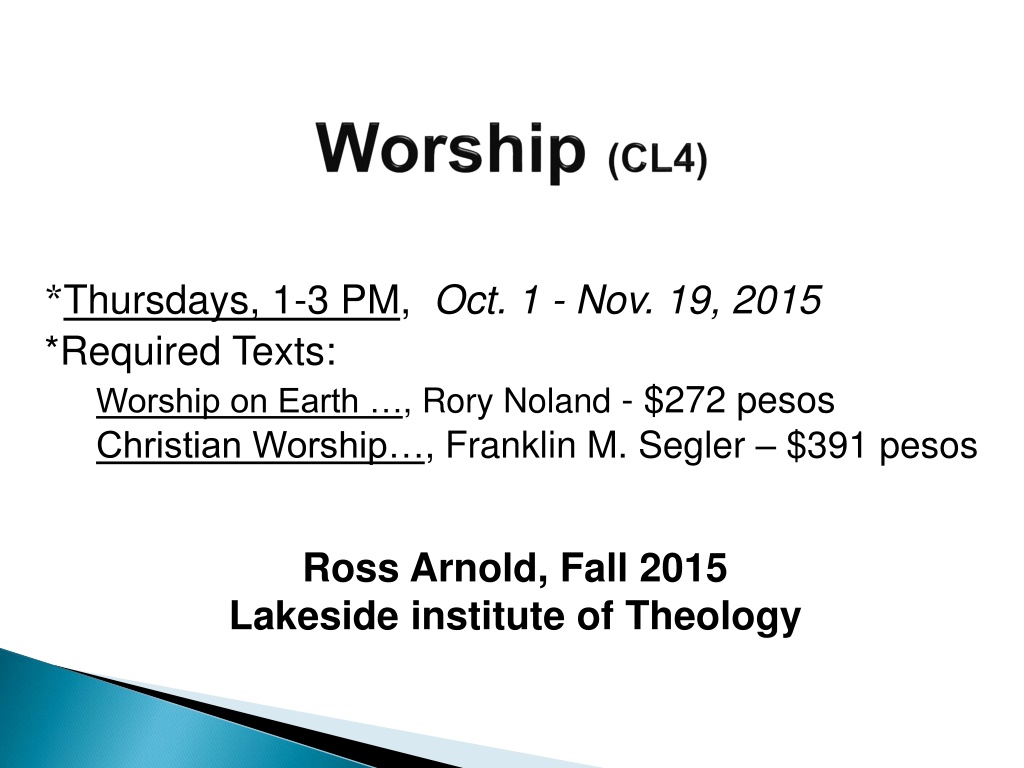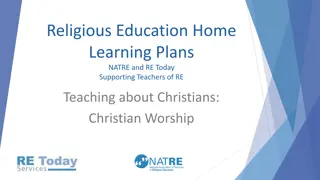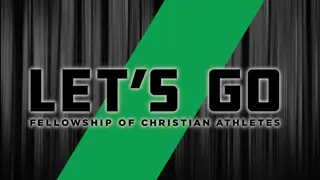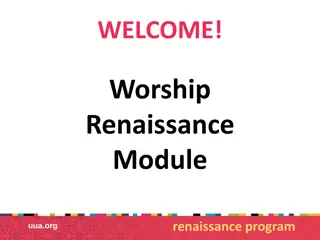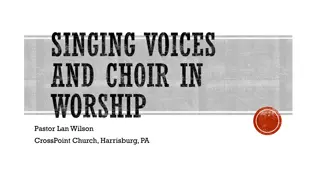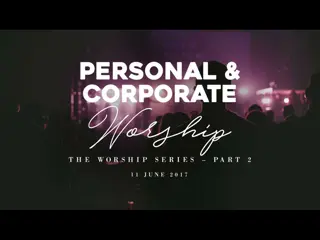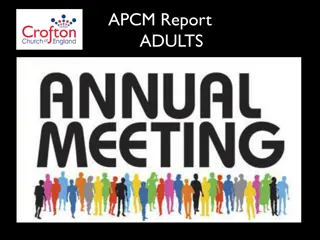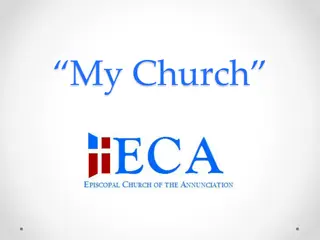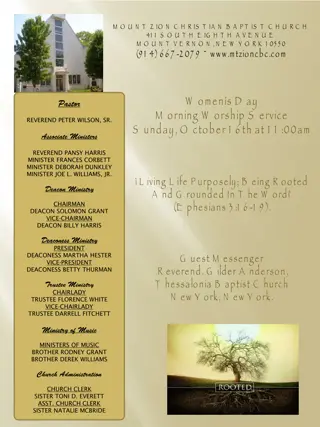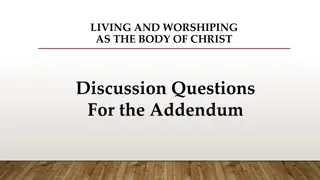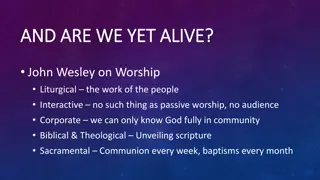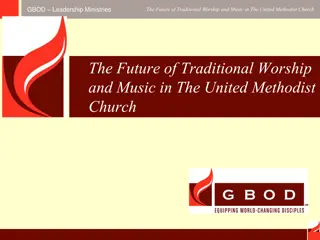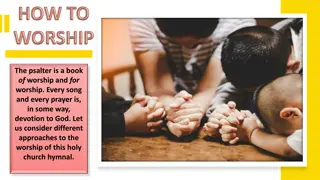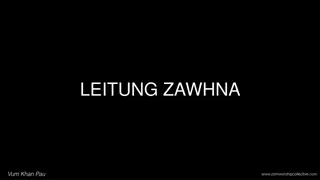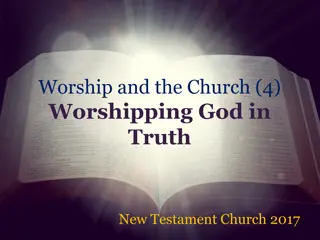Christian Worship Through the Ages
Exploring the evolution of Christian worship over history, from countercultural beginnings to modern-day expressions incorporating music, multimedia, and various forms of artistic engagement.
Download Presentation

Please find below an Image/Link to download the presentation.
The content on the website is provided AS IS for your information and personal use only. It may not be sold, licensed, or shared on other websites without obtaining consent from the author.If you encounter any issues during the download, it is possible that the publisher has removed the file from their server.
You are allowed to download the files provided on this website for personal or commercial use, subject to the condition that they are used lawfully. All files are the property of their respective owners.
The content on the website is provided AS IS for your information and personal use only. It may not be sold, licensed, or shared on other websites without obtaining consent from the author.
E N D
Presentation Transcript
*Thursdays, 1-3 PM, Oct. 1 - Nov. 19, 2015 *Required Texts: Worship on Earth , Rory Noland - $272 pesos Christian Worship , Franklin M. Segler $391 pesos Ross Arnold, Fall 2015 Lakeside institute of Theology
Policies and Requirements 1. Classes are free, but all students seeking a certificate or degree must purchase books (paper, not electronic), which will be made available by the Institute. 2. Students in certificate or degree tracks may miss no more than one class per course, without arrangements made in advance with the teacher to make up missed work (at the discretion of the teacher). 3. Students in certificate or degree tracks will be required to take a pass/fail final exam in each course, based on study guidelines provided by the teacher. 4. Students in certificate or degree tracks must make a passing grade (based on "pass/fail") in each course in order to receive credit towards a certificate or degree. 5. Candidates for degrees (Master of Theology and Master of Theology & Ministry) must be approved by the Institute Director before final admission into a degree program.
Policies and Requirements for making up classes, or taking classes online(as of April 3, 2014): I. All make-up classes must be completed before the beginning of the following term, unless you make special arrangements with the professor. II. All classes made up online must be reported via email to rda@rossarnold.net, as follows: A. Each class much be reported in a separate email as soon after watching as possible. B. Each email must contain the following information: 1. Course title and/or code (NT4, OT3, TH2, etc.). 2. The date of the original lecture you missed. 3. The title of the lecture. 4. A clear statement that you watched all of the lecture video, reviewed the materials and completed the required readings. III. Courses taken entirely online require prior approval, and apply only to audit or Certificate (not degree) requirements.
A Brief History of Christian Worship For three Centuries, Christian worship was countercultural. In the 4th century, Christianity became legal and began adapting Roman ceremonies into it s liturgy, with an emphasis on drama & ritual. The 15th century invention of the Gutenberg press shifted worship away from enacted drama and towards the written and spoken word. The 16th century Protestant Reformation further shifted worship away from symbol and ceremony, in favor of verbal communication. The Enlightenment (17th-18th centuries) emphasized rationalism and explanation, leading to sermons & teaching as the primary purposes of worship. The 19th century Romantic movement reintroduced emotion, and revivalism was born, with emphases on singing, fervent preaching and conversions. In the 1960s music took center stage as the primary form of church communication and worship, with emphasis on contemporary music (folk and then rock), and on personal and enthusiastic experience in worship. And today pipe organs and choirs, AND electrified instruments and drums, AND multimedia presentations, video projectors, interpretive dance, drama, and
What is Worship? (defining it is HARD!) Speaking sociologically, Christian worship is a form of ritual human behavior that is purposeful, repetitive, social and interpersonal, and serves a communal function. In 1544 (at the dedication of the first church built for Protestant worship) Martin Luther said of Christian worship, that nothing else be done in it than that our dear Lord Himself talk to us through His holy word and that we, in turn, talk to Him in prayer and songs of praise. In his Large Catechism, Luther emphasizes the duality of revelation and response when says that in worship the people assemble to hear and discuss God s Word and then praise God with song and prayer. Archbishop Thomas Cranmer said worship is directed to God s glory and right human conduct: setting forth of God s honor and glory, and the reducing of the people to the most perfect and godly living.
What is Worship? Christian worship is response to the Divine call, to the mighty deeds of God, culminating in the redemptive act of Christ. Christian worship is primarily and essentially an act of praise and adoration, which also implies a thankful acknowledgement of God s embracing love and redemptive loving-kindness. Worship is for the glory of God and the sanctification and edification of the faithful. Worship is not a human invention; rather it is a divine offering. God offers himself in a personal relationship, and we respond God s offer of love elicits our response in worship. Worship is the offering of our total selves to God our intellects, our feelings, our attitudes and our possessions. Pope Pius X Franklin M. Segler
Worship corporate worship, both Biblically and through the Church s history, is about remembrance and anticipation. Content there has been a crisis of content in the modern worship movement, because it is disembodied; it is de- historicized; and it is individualized. Structure The story of God is communicated in the narrative of Word and Table, which is deeply rooted in God s narrative to us. The Word read and preached remembers God s story through the Christ event; while Eucharistic prayers, songs, and symbols usher us into anticipation of the future kingdom of God. (Robert Webber) Style music is where corporate worship is contextualized, and may be viewed as a cultural language. Congregational worship must be translated into those languages.
Three challenges facing modern Worship 1. Limited supernaturalism 2. Anti-historical bias 3. Sacramentalization of singing
What Proper Worship Must Be 1. Christ-centered. In contrast with being audience-driven. Worship (including congregational music) must not be shaped around the congregation but around Christ. This means the content of the songs point to Christ; it means the sermon ends not with a call to try harder or do better, but to behold Christ as our Great Redeemer. 2. Gospel-shaped. Worship must orient people around the Scripture and around the Sacrament Word and Table. Instead, many church services are structured like a variety-show. 3. Spirit-filled. Not in the Pentecostal tradition so much as the miracle of Pentecost itself: when the Spirit empowered the apostles to proclaim the Gospel in the language of various peoples so that they understood it and were convicted by it.
This issue (of worship) has been framed poorly. It s not about old vs. new. It s not about old vs. young (especially these days). It s not about taste. It s not about what kind of music God likes more. It s not really about music. It s about the very purpose of gathered worship. It s about unity, not choice. It s about Holy Scripture, not self-help. It s about theology, not experience. It s about participation, not consumption. It s about liturgy, not jesusy entertainment. It s about being a church for the world, not getting butts in the seats. It s about ancient and future, not just now. Jonathan Aigner
Contemporary worship to me is an oxymoron. Biblically, worship is what angels and morning stars did before creation; what Abraham, Moses and the Levites, and the many-tongued Jewish diaspora at Pentecost did. It is what the martyrs, now ascended, do, and what all believers since the apostles have done. More importantly, it is what we will do eternally; worship is essentially (not accidentally) eschatological. And nothing could celebrate the eschatological forever less than something that celebrates the contemporary now. So ultimately, I think the Apostles Creed will stick its camel s nose into the liturgical tent, and assert again our celebration of the holy catholic church, the communion of the saints. The sooner the better. T. David Gordon
